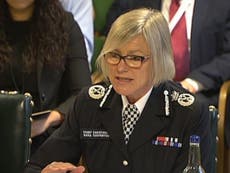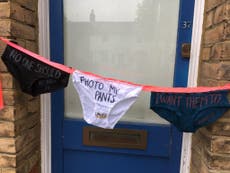Chief constable Sara Thornton wants us to ‘focus on crime, not misogyny’ – why doesn’t she see misogynist abuse as criminal?
In classing misogyny as a hate crime, the force would not only potentially route out the future perpetrators of the more severe crimes, they might go some way to regaining women’s trust

Chief constable Sara Thornton, one of the UK’s most senior police officers, has said that she does not want to see misogyny and misandry classed as hate crimes because forces are “seriously stretched” and need to "refocus on core policing".
You only have to look at the numbers to realise what Ms Thornton is getting at. Homicide and knife-related offences are rising, but since 2010 there has been a 19 per cent decrease in funding for the police. Officer numbers have fallen by more than 20,000.
I can see why the force isn't clamouring to add to their list of responsibilities. Ms Thornton told journalists: “We all think misogyny and misandry are an issue… I’m questioning whether a criminal offence is the best way of dealing with what is essentially an issue about how we all treat each other.”
I agree with this decision in part; I don’t think that misandry should be treated as a hate crime. In fact, I think it’s dangerous to lump misogyny and misandry within the same category, when the former is economically, socially and politically palpable and the latter is unclear, intangible and not historically entrenched. Men can be discriminated against on the basis of their gender, but usually, this too is the result of misogyny – the idea that feminine qualities are inferior and that the ideal man should be a paragon of masculinity.
But, I do think that making misogyny – that dangerous force which underpins so many severe offences – a hate crime is a necessary and potential socially transformative proposal. When we discuss our struggling NHS, we’re always quick to mention the economic benefits of preventative medicine. Trying to stop people from getting ill in the first place seems like a logically sound strategy for a struggling health service. Wouldn’t outlawing misogyny have a similar effect?
Of course, it would take time and effort to police the sort of sexism (what we’ve come to refer to as “everyday sexism”) that remains rife in this country. Yes, misogyny seems to permeate every fibre of the online world, and routing it out entirely would be an unmanageably mammoth task. But, in criminalising acts such as sending a woman grossly sexist messages, or shouting misogynistic abuse on the street, the police would create a much-needed deterrent. They would send a clear and cogent message: spreading gender-based hatred is not acceptable, and not without consequence.
So many crimes which tend to have a gendered dimension – stalking, sexual assault, rape – are frequently mishandled by the police. In classing misogyny as a hate crime, the force would not only potentially route out the future perpetrators of these more severe crimes, they might go some way to regaining women’s trust.
Currently, even sexist behaviour that is defined as criminal is treated like an unpleasant social phenomenon, rather than an actual offence. Last night I was at a bar, and I saw a sign that read: “We have a zero tolerance policy on sexual assault”. These words were welcome, yet troubling. Imagine a sign that read: “We have a zero tolerance policy on pick-pocketing.” It would seem ludicrously redundant. Pick-pocketing is obviously a crime, not something for an individual establishment to have a unique policy on. But sexual assault, also illegal, seems to exist in an alternative category. Socially speaking, it’s not yet gained the criminal status it demands.
But if we shifted the parameters, and made misogyny a hate crime, we would hopefully recalibrate our understanding of other crimes against women. The police would be sending out a clear signal that they take women’s safety seriously; that they’re on the lookout for red flags; that they believe women who’ve identified a threat and that they want to do something about it.
Laws will always lag behind social change. Before 1975, it was legal to discriminate against women in work, education and training on the basis of their sex in the UK. Before 1991, in England and Wales, it was legal for a husband to rape his wives. Upskirting, the practice of putting a camera up a woman’s skirt, is expected to become a criminal offence, but up until now this depraved behaviour has been totally legal.
We’re still at an early stage of this conversation about whether or not misogyny should be made a hate crime, but I have little doubt that the law will eventually catch up and come to reflect the social shift that we’ve seen take place over the past few years. It may take decades, it may take a better-funded police force, but I hope, in generations to come, women will talk about a time where misogyny was not considered to be a hate crime, with shock and disbelief.





Join our commenting forum
Join thought-provoking conversations, follow other Independent readers and see their replies